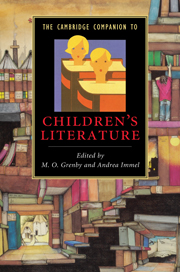Book contents
- Frontmatter
- Part I Contexts and Genres
- 1 The origins of children’s literature
- 2 Children’s books and constructions of childhood
- 3 The making of children’s books
- 4 Picture-book worlds and ways of seeing
- 5 The fear of poetry
- 6 Retelling stories across time and cultures
- 7 Classics and canons
- Part II Audiences
- Part III Forms and Themes
- Further reading
- Index
6 - Retelling stories across time and cultures
from Part I - Contexts and Genres
Published online by Cambridge University Press: 28 November 2010
- Frontmatter
- Part I Contexts and Genres
- 1 The origins of children’s literature
- 2 Children’s books and constructions of childhood
- 3 The making of children’s books
- 4 Picture-book worlds and ways of seeing
- 5 The fear of poetry
- 6 Retelling stories across time and cultures
- 7 Classics and canons
- Part II Audiences
- Part III Forms and Themes
- Further reading
- Index
Summary
Throughout the world, literature for children originates with retelling and adapting the familiar stories of a culture - folktales, legends and stories about historical and fictional individuals memorialised for their heroism or holiness, adventurousness or mischief. When English-language children's literature emerged as a visible entity from the seventeenth century, it followed this route, with the publication of various fairy (or folk) tale collections and religious texts. Subsequently, the principal domains of retold stories in children's literature expanded to include myths and mythologies; medieval and quasi-medieval romance, especially tales of King Arthur's knights; stories about legendary heroes such as Robin Hood; oriental tales, usually linked with The Arabian Nights; and modern classics, from Shakespeare to Kenneth Grahame and L. Frank Baum.
A story retold for children serves important literary and social functions, inducting its audience into the social, ethical and aesthetic values of the producing culture. Retellings are thus marked by a strong sense that there is a distinct canon within any of the domains. The tendency for children's literature to evolve as both separate and specialised is very pertinent here: its dominant concerns, especially social issues and personal maturation, make retellings for children a special area, which cannot be simply covered by implication in studies which do not explicitly discuss writing for children. Only a couple of the principal domains of retellings can boast a study dedicated to this writing, however.
- Type
- Chapter
- Information
- The Cambridge Companion to Children's Literature , pp. 91 - 107Publisher: Cambridge University PressPrint publication year: 2009
- 5
- Cited by

